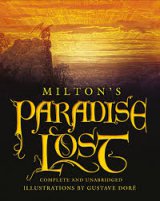Paradise Lost Page #6
Paradise Lost is an epic poem in blank verse by the 17th-century English poet John Milton. The first version, published in 1667, consisted of ten books with over ten thousand lines of verse. A second edition followed in 1674, arranged into twelve books with minor revisions throughout and a note on the versification.
He ceas’d, and next him Moloc, Scepter’d King Stood up, the strongest and the fiercest Spirit That fought in Heav’n; now fiercer by despair: His trust was with th’ Eternal to be deem’d Equal in strength, and rather then be less Car’d not to be at all; with that care lost Went all his fear: of God, or Hell, or worse He reckd not, and these words thereafter spake. My sentence is for open Warr: Of Wiles, More unexpert, I boast not: them let those Contrive who need, or when they need, not now. For while they sit contriving, shall the rest, Millions that stand in Arms, and longing wait The Signal to ascend, sit lingring here Heav’ns fugitives, and for thir dwelling place Accept this dark opprobrious Den of shame, The Prison of his Tyranny who Reigns By our delay? no, let us rather choose Arm’d with Hell flames and fury all at once O’re Heav’ns high Towrs to force resistless way, Turning our Tortures into horrid Arms Against the Torturer; when to meet the noise Of his Almighty Engin he shall hear Infernal Thunder, and for Lightning see Black fire and horror shot with equal rage Among his Angels; and his Throne it self Mixt with Tartarean Sulphur, and strange fire, His own invented Torments. But perhaps The way seems difficult and steep to scale With upright wing against a higher foe. Let such bethink them, if the sleepy drench Of that forgetful Lake benumme not still, That in our proper motion we ascend Up to our native seat: descent and fall To us is adverse. Who but felt of late When the fierce Foe hung on our brok’n Rear Insulting, and pursu’d us through the Deep, With what compulsion and laborious flight We sunk thus low? Th’ ascent is easie then; Th’ event is fear’d; should we again provoke Our stronger, some worse way his wrath may find To our destruction: if there be in Hell Fear to be worse destroy’d: what can be worse Then to dwell here, driv’n out from bliss, condemn’d In this abhorred deep to utter woe; Where pain of unextinguishable fire Must exercise us without hope of end The Vassals of his anger, when the Scourge Inexorably, and the torturing houre Calls us to Penance? More destroy’d then thus We should be quite abolisht and expire. What fear we then? what doubt we to incense His utmost ire? which to the highth enrag’d, Will either quite consume us, and reduce To nothing this essential, happier farr Then miserable to have eternal being: Or if our substance be indeed Divine, And cannot cease to be, we are at worst On this side nothing; and by proof we feel Our power sufficient to disturb his Heav’n, And with perpetual inrodes to Allarme, Though inaccessible, his fatal Throne: Which if not Victory is yet Revenge. He ended frowning, and his look denounc’d Desperate revenge, and Battel dangerous To less then Gods. On th’ other side up rose Belial, in act more graceful and humane; A fairer person lost not Heav’n; he seemd For dignity compos’d and high exploit: But all was false and hollow; though his Tongue Dropt Manna, and could make the worse appear The better reason, to perplex and dash Maturest Counsels: for his thoughts were low; To vice industrious, but to Nobler deeds Timorous and slothful: yet he pleas’d the eare, And with perswasive accent thus began. I should be much for open Warr, O Peers, As not behind in hate; if what was urg’d Main reason to perswade immediate Warr, Did not disswade me most, and seem to cast Ominous conjecture on the whole success: When he who most excels in fact of Arms, In what he counsels and in what excels Mistrustful, grounds his courage on despair And utter dissolution, as the scope Of all his aim, after some dire revenge. First, what Revenge? the Towrs of Heav’n are fill’d With Armed watch, that render all access Impregnable; oft on the bordering Deep Encamp thir Legions, or with obscure wing Scout farr and wide into the Realm of night, Scorning surprize. Or could we break our way By force, and at our heels all Hell should rise With blackest Insurrection, to confound Heav’ns purest Light, yet our great Enemie All incorruptible would on his Throne Sit unpolluted, and th’ Ethereal mould Incapable of stain would soon expel Her mischief, and purge off the baser fire Victorious. Thus repuls’d, our final hope Is flat despair: we must exasperate Th’ Almighty Victor to spend all his rage, And that must end us, that must be our cure, To be no more; sad cure; for who would loose, Though full of pain, this intellectual being, Those thoughts that wander through Eternity, To perish rather, swallowd up and lost In the wide womb of uncreated night, Devoid of sense and motion? and who knows, Let this be good, whether our angry Foe Can give it, or will ever? how he can Is doubtful; that he never will is sure. Will he, so wise, let loose at once his ire, Belike through impotence, or unaware, To give his Enemies thir wish, and end Them in his anger, whom his anger saves To punish endless? wherefore cease we then? Say they who counsel Warr, we are decreed, Reserv’d and destin’d to Eternal woe; Whatever doing, what can we suffer more, What can we suffer worse? is this then worst, Thus sitting, thus consulting, thus in Arms? What when we fled amain, pursu’d and strook With Heav’ns afflicting Thunder, and besought The Deep to shelter us? this Hell then seem’d A refuge from those wounds: or when we lay Chain’d on the burning Lake? that sure was worse. What if the breath that kindl’d those grim fires Awak’d should blow them into sevenfold rage And plunge us in the Flames? or from above Should intermitted vengeance Arme again His red right hand to plague us? what if all Her stores were op’n’d, and this Firmament Of Hell should spout her Cataracts of Fire, Impendent horrors, threatning hideous fall One day upon our heads; while we perhaps Designing or exhorting glorious Warr, Caught in a fierie Tempest shall be hurl’d Each on his rock transfixt, the sport and prey Of racking whirlwinds, or for ever sunk Under yon boyling Ocean, wrapt in Chains; There to converse with everlasting groans, Unrespited, unpitied, unrepreevd, Ages of hopeless end; this would be worse. Warr therefore, open or conceal’d, alike My voice disswades; for what can force or guile With him, or who deceive his mind, whose eye Views all things at one view? he from heav’ns highth All these our motions vain, sees and derides; Not more Almighty to resist our might Then wise to frustrate all our plots and wiles. Shall we then live thus vile, the race of Heav’n Thus trampl’d, thus expell’d to suffer here Chains & these Torments? better these then worse By my advice; since fate inevitable Subdues us, and Omnipotent Decree, The Victors will. To suffer, as to doe, Our strength is equal, nor the Law unjust That so ordains: this was at first resolv’d, If we were wise, against so great a foe Contending, and so doubtful what might fall. I laugh, when those who at the Spear are bold And vent’rous, if that fail them, shrink and fear What yet they know must follow, to endure Exile, or ignominy, or bonds, or pain, The sentence of thir Conquerour: This is now Our doom; which if we can sustain and bear, Our Supream Foe in time may much remit His anger, and perhaps thus farr remov’d Not mind us not offending, satisfi’d With what is punish’t; whence these raging fires Will slack’n, if his breath stir not thir flames. Our purer essence then will overcome Thir noxious vapour, or enur’d not feel, Or chang’d at length, and to the place conformd In temper and in nature, will receive Familiar the fierce heat, and void of pain; This horror will grow milde, this darkness light, Besides what hope the never-ending flight Of future days may bring, what chance, what change Worth waiting, since our present lot appeers For happy though but ill, for ill not worst, If we procure not to our selves more woe.
Translation
Translate and read this book in other languages:
Select another language:
- - Select -
- 简体中文 (Chinese - Simplified)
- 繁體中文 (Chinese - Traditional)
- Español (Spanish)
- Esperanto (Esperanto)
- 日本語 (Japanese)
- Português (Portuguese)
- Deutsch (German)
- العربية (Arabic)
- Français (French)
- Русский (Russian)
- ಕನ್ನಡ (Kannada)
- 한국어 (Korean)
- עברית (Hebrew)
- Gaeilge (Irish)
- Українська (Ukrainian)
- اردو (Urdu)
- Magyar (Hungarian)
- मानक हिन्दी (Hindi)
- Indonesia (Indonesian)
- Italiano (Italian)
- தமிழ் (Tamil)
- Türkçe (Turkish)
- తెలుగు (Telugu)
- ภาษาไทย (Thai)
- Tiếng Việt (Vietnamese)
- Čeština (Czech)
- Polski (Polish)
- Bahasa Indonesia (Indonesian)
- Românește (Romanian)
- Nederlands (Dutch)
- Ελληνικά (Greek)
- Latinum (Latin)
- Svenska (Swedish)
- Dansk (Danish)
- Suomi (Finnish)
- فارسی (Persian)
- ייִדיש (Yiddish)
- հայերեն (Armenian)
- Norsk (Norwegian)
- English (English)
Citation
Use the citation below to add this book to your bibliography:
Style:MLAChicagoAPA
"Paradise Lost Books." Literature.com. STANDS4 LLC, 2024. Web. 22 Nov. 2024. <https://www.literature.com/book/paradise_lost_101>.




Discuss this Paradise Lost book with the community:
Report Comment
We're doing our best to make sure our content is useful, accurate and safe.
If by any chance you spot an inappropriate comment while navigating through our website please use this form to let us know, and we'll take care of it shortly.
Attachment
You need to be logged in to favorite.
Log In